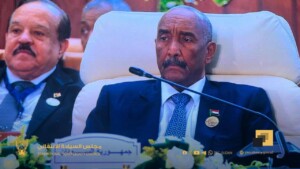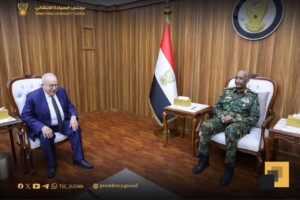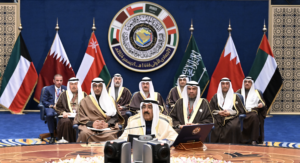AU: ‘Holistic solution’ required for Sudan
In the 539th meeting of the Peace and Security Council of the African Union (AUPSC) held on 25 August, the Council discussed the activities of the AU High-level Implementation Panel (AUHIP) for Sudan and South Sudan, and demanded the various Sudanese parties concert their efforts to realise peace in the country.
The Peace and Security Council of the African Union (AUPSC) has demanded the various parties in Sudan concert their efforts to realise peace and a democratic transformation in the country.
In the 539th AUPSC meeting held on 25 August, the Council discussed the activities of the AU High-level Implementation Panel (AUHIP) for Sudan and South Sudan.
It notes “with deep disappointment and concern that despite the decisions and encouragement of Council, the more than six years of unparalleled efforts of the AUHIP, as well as the support offered by the international community, the fundamental challenges of the Sudanese nation remain unresolved and insufficient progress has been made in the implementation of the Roadmap for the National Dialogue and in the efforts to end Sudan’s long-running conflicts,” the AU body stated in its 539th communiqué released on Tuesday.
The council reiterates its endorsement of the work of the AUHIP to “ensure harmonised and focused action in support of the efforts of the Sudanese stakeholders to address the challenges confronting their country” and commends the efforts of the AUHIP and the head of the joint UN-AU peacekeeping mission in Darfur (Unamid) to facilitate negotiations “within the context of the agreed one-process-two-track approach to end all violent conflicts in Sudan”.
National Dialogue
The AUSCP strongly urges the Sudanese parties, especially the government, to “demonstrate the necessary leadership and re-commitment to processes required for achieving the goal of realising the democratic transformation of Sudan, especially through the organisation of an all-inclusive, transparent, adequately prepared and credible National Dialogue.”
In this regard, the Council points to the report of the AU Panel on Darfur (AUPD), as adopted by its 207th meeting held in Nigeria on 29 October 2009, “whose analysis is the foundation of the AU policy on Sudan”, that concluded that the crisis in Darfur can only be resolved in a holistic manner, within the context of a comprehensive national peace process, including democratisation.
The Sudanese parties, especially the government, should demonstrate leadership and re-commitment to the democratic transformation of Sudan, especially through an all-inclusive and credible National Dialogue.
The AU body confirms its support for the National Dialogue announced by President Omar Al Bashir in January 2014, and affirms the principle adopted by the Sudanese parties that the “Dialogue should be an all-inclusive Sudanese process intended to address and resolve the long-standing challenges faced by the Sudanese nation and based on the agenda of peace and national unity, economy, basic rights and freedoms, national identity, constitutional review and governance and international relations”. The Council further notes that the “objectives of the National Dialogue are consistent with the principles espoused in the AUPD Report”.
The Sudanese parties are reminded of the AU’s commitment to leverage financial and economic assistance for the stabilisation of the Sudanese economy, as part of the support package associated with the National Dialogue process, and of their own commitment to establish a conducive environment by the adoption of confidence-building measures.
Ceasefire
The AU Council therefore welcomes the statement made by President Omar Al Bashir that Khartoum is prepared to observe a two-month ceasefire as well as his commitment to grant amnesty to members of the armed movements to enable them to safely attend the Dialogue.
Stopping the armed conflicts is an absolute requirement for the National Dialogue to proceed, the communiqué reads. In this context, the Council expresses its grave concern about the ongoing conflict and humanitarian crises in Darfur and the Two Areas (South Kordofan and Blue Nile states).
The AUPSC calls upon the parties to “urgently reach agreements to facilitate and allow humanitarian assistance to reach those in need and to respect human rights and International Humanitarian Law” and to “take all necessary measures to create conditions for the safe, voluntary and dignified return of the displaced persons and refugees to their homes”.
Cooperation
In its repeated call on the Sudanese government and all concerned parties to cooperate with the AUHIP in all aspects of its mandate, the AUSPC
(i) calls upon the Government of Sudan to desist from any actions that would undermine confidence in the process or jeopardize the possibility of holding a credible and all-inclusive National Dialogue within Sudan;
(ii) reiterates its call for an urgent pre-National Dialogue meeting of all relevant parties, at the AU Headquarters in Addis Ababa, to discuss and agree on procedural matters relating to the Dialogue;
(iii) requests the AUHIP to continue its engagement with the Government of Sudan and the other Sudanese stakeholders in support of their efforts to realize an all-inclusive, transparent and credible National Dialogue, and, in this regard, urges all parties to extend the fullest cooperation to the Panel;
(iv) further urges the Parties to reinvigorate their efforts to stop the wars in Darfur and the Two Areas, and requests the AUHIP, in line with Council’s previous decisions, to continue to facilitate negotiations to stop the war and intercommunal violence in Darfur and the war in the Two Areas;
(v) reaffirms its determination to assist all the Sudanese parties with regard to the National Dialogue and the search for peace in Sudan, with a view to taking such additional decisions and actions as may be necessary to help ensure that the goal of the democratic transformation of Sudan is not derailed, and in particular that an all-inclusive and credible Sudanese National Dialogue is organized; and
(vi) requests the AUHIP to report to Council, within 90 days of this decision, on the re-engagement of the Sudanese stakeholders with the processes towards an all-inclusive and credible National Dialogue as envisaged in the Roadmap and the necessary efforts for bringing to an end the conflicts in Darfur and the Two Areas.
South Sudan and Abyei
The AUSPC further urges the governments of Sudan and South Sudan to continue the implementation of the Cooperation Agreement in order to establish peaceful and cooperative relations between the two countries, and calls for holding an extraordinary meeting of the Joint Political and Security Mechanism (JPSM) with the support of the AUHIP.
It reaffirms the continued relevance of the Agreement on the Temporary Security and Administrative Arrangements for the Abyei Area of 20 June 2011 and its previous decisions on the situation in the Abyei Area. Council commends in this regard the UN Interim Security Force for Abyei (UNISFA) for its outstanding contribution to peace in Abyei and demands that the parties extend full cooperation to the UN mechanism.
The Council commends the work of the AU Border Programme (AUBP) in assisting the parties to implement the Agreement on Border Issues and to strengthen their capacity to manage border issues, and expresses its appreciation of the tireless efforts of the AU Team of Experts (AUTE) on the Disputed Border Areas.
Efforts commended
It lauds the AUHIP and its members, namely former Presidents Thabo Mbeki, Abdulsalami Abubakar and Pierre Buyoya, and the support staff, “for their patient and unwavering engagement with Sudan, dating back to the establishment of the AUPD in July 2008”, and welcomes “the continuing engagement and support of the State of Qatar in the search for peace in Darfur, in particular its significant financial contribution for the implementation of the Doha Document for Peace in Darfur (DDPD) and the Darfur Development Strategy (DDS)”.
It also commends “the tireless efforts of the AUHIP in seeking to facilitate a peaceful resolution of the conflict in the Two Areas between the Sudanese government and the Sudan People’s Liberation Movement-North (SPLM-N), […] and notes that, as reflected in the draft Framework Agreement of December 2014, the negotiations have already yielded substantial consensus capable of forming the basis for the resolution of that conflict”.
The Council further expresses appreciation for the chairman of the Intergovernmental Authority on Development (IGAD), Prime Minister Hailemariam Desalegn of Ethiopia, for his commitment to the promotion of peace, security and stability in the Horn of Africa region, the Special Envoy of the UN Secretary-General, Haile Menkerios, Unamid’s Acting Joint Special Representative (JSR) Abiodun Bashua, and the Special Envoy of IGAD, Lissane Yohannes, “in their overall efforts aimed at achieving peace, security and stability” in the Horn of Africa.











 and then
and then